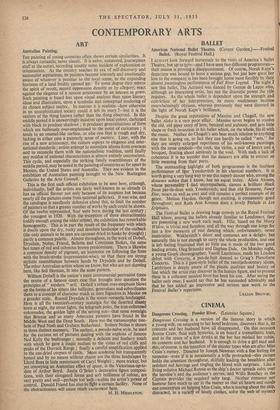BALLET
American National Ballet Theatre. (Covent Garden.)—Festival Ballet. (Royal Festival Hall.)
I ALWAYS look forward immensely to the visits of America's Ballet Theatre, but up to now—and I have seen two different programmes— their season is proving a disappointment. Of course, Norah Kaye's departure was bound to leave a serious gap, but just how great her loss to the company is has been brought home most forcibly by their almost meaningless performance of Fall River Legend. The night I saw this ballet, The Accused was danced by Gemze de Lappe who, although an interesting artist, has not the dramatic power the role requires. As the whole ballet is dependent upon the strength and conviction of her interpretation, its many weaknesses become overwhelmingly obvious, whereas previously they were dimmed in the light of Norah Kaye's brilliance.
Despite the great reputations of Massine and Chagall, the new ballet Aleko is a very poor affair. Massine never begins to resolve the old, old gipsy story of love, betrayal and jealousy, and gets little shape or fresh invention in his ballet which, on the whole, fits ill with the music. Neither do Chagall's sets bear much relation to anything else that is going on, in fact they can hardly be called "sets," for they are simply enlarged repetitions of his well-known paintings with the same symbols—the cock, the violin, a pair of lovers and a bouquet, floating about aimlessly in the void. With such a lack of coherence it is no wonder that the dancers are able to extract sr) little meaning from their parts.
The outstanding highlight of both programmes is the faultless performance of Igor Youskevitch in his classical numbers. It is worth going a very long way to see this superb dancer who, among the danseurs nobles that I know, has no equal today. Alicia Alonso, whose personality I find unsympathetic, dances a brilliant Black Swan pas-de-deux with Youskevitch; and that old favourite, Fancy Free, wears as well as ever and still remains a perfect example of its genre. Melissa Hayden, though not exciting, is consistently good throughout; and Ruth Ann Koesun does a lovely Prelude in Les Sylphides.
The Festival Ballet is drawing huge crowds to the Royal Festival Hall where, among the ballets already familiar to Londoners, they are presenting a new work each week. Villa, based on the Merry Widow, is trivial and formless, and all the way through one longs for just a few moments of real dancing which, unfortunately, never materialise. Wakhevitch's decor and costumes are a delight, but naturally this is not enough to carry the whole production, and one is left feeling frustrated that so little use is made of the two good leading artists, Oleg Briansky and Daphne Dale. On Monday night, a young Greek choreographer, Vassili Lambrinos, made his London debut with Concerto, a pas-de-huit danced to Grieg's Pianoforte Concerto. This is a pure-style ballet of the twentieth-century idiom. Lambrinos is deeply aware of the plastic qualities and beauty of line which the artist may discover in the human figure, and to present these in a coherent musical form has been his aim. After seeing the ballet only once, I would say that he has succeeded admirably and that he has added an impressive and serious new work to the Festival Ballet's repertoire.
LILLIAN BROWSE.


































 Previous page
Previous page